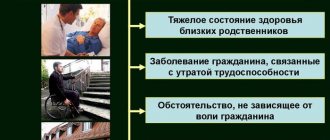Correctional work - what is it?
On January 1, 2022, a new type of alternative criminal punishment began to operate in Russia - forced labor. If the judge imposes such a punishment, the convicted person will serve his sentence not in a colony, but in a correctional center. Essentially this is the same hostel.
There is provision for both personal time for the convicted person, which he can spend, including outside the correctional center, with the permission of the administration of this center, and visit public places, have lunch outside the center, and meet with relatives.
However, a prerequisite for such punishment is that the convicted person must work and give part of the money from the salary received for his maintenance. The main goal of alternative punishment is the re-education of citizens who have committed a crime of minor or moderate gravity.
That is, for stealing a sack of potatoes, for example, you should not be immediately sent to prison, but given the opportunity to make amends by working. The possibility of further humanization of criminal penalties in general, and the possibility of reducing the number of residents in correctional institutions is being considered.
In addition, the state does not spend money on such convicts, and these are billions of rubles that remain in the state budget. At the moment in Russia there are several other types of punishments that are not related to imprisonment. For example, correctional work. They are appointed for a period of 2 months to 2 years.
For example, the court sentenced citizen L. to 6 years for drug possession. The woman behaved well in the colony. The punishment was commuted. The remaining sentence is 1 year and 9 months, the woman works out of prison: she cleans entrances and leaves. Salary 17,000 rubles. 5% goes to the state.
Contributions to the state can range from 5% to 20% of the salary, at the discretion of the judge. A list of vacancies for convicts is provided by the penitentiary service.
The legislation provides that if a convicted person at the time of registration with the inspectorate has a main place of work and can document this, he remains to perform correctional labor at the enterprise.
Another type of alternative punishment is compulsory labor. Their term is much shorter. Maximum - 480 hours. The difference here is that the convicted person performs community service for free, 2 hours a day, after his main job.
The judge decides which type of punishment to impose from the above. Currently in Russia approximately 588,000 people are convicted of non-custodial sentences. They are not in a colony, but free. Albeit with minor restrictions.
How are correctional labor assigned?
According to Art. 50 of the Criminal Code of the Russian Federation - correctional labor is assigned to a convicted person who has a main place of work, as well as to those who do not have one. That is, both those who work and those who do not work. A convicted person who has a main place of work serves correctional labor at his main place of work.
A convict who does not have a main place of work serves correctional labor in places determined by local government bodies, in agreement with the penal inspection, but in the area of the convict’s place of residence.
Appointed for a period from 2 months to 2 years. From the salary of a person sentenced to correctional labor, a deduction is made to the state income in the amount established by a court verdict, ranging from 5% to 20%.
In case of malicious evasion of a convicted person from serving correctional labor, the court may replace the unserved sentence:
- forced labor;
- imprisonment, at the rate of 1 day of forced labor or 1 day of imprisonment for 3 days of correctional labor.
If our mandatory work is measured in hours, here it is measured in days. Correctional work, like imprisonment, can be suspended. Not assigned to persons recognized:
- disabled people of group I;
- pregnant women;
- women with children under 3 years of age;
- military personnel undergoing military service under conscription, as well as military personnel undergoing military service under a contract in military positions as privates and sergeants, if they have not served the statutory period of conscription service at the time of the court’s verdict.
The type of punishment is quite light. When recalculating failure to comply with negotiations in the form of correctional labor or compulsory labor, forced labor is equivalent to imprisonment.
My own lawyer
This type of release from punishment assumes that the correction process is not completely completed, but can be continued while the convicted person is serving a more lenient sentence and when the conditions for serving a different type of sentence are met. If a convicted person does not fulfill his duties while serving a new sentence, the court may again replace the unserved term with imprisonment.
Replacing the unserved part of the sentence with a milder type of punishment applies to those sentenced to imprisonment for crimes of any gravity, as well as to those serving a sentence in a disciplinary military unit or forced labor.
The Plenum of the Supreme Court of the Russian Federation in Resolution No. 8 dated April 21, 2009 “On the judicial practice of parole from serving a sentence, replacing the unserved part of the punishment with a more lenient type of punishment,” explained that the court can replace the unserved part of the punishment with a more lenient type of punishment specified in Art. 44 of the Criminal Code of the Russian Federation, which, by virtue of Part 3 of Art.
80 of the Criminal Code of the Russian Federation cannot be greater than the maximum term or amount of punishment provided for by the Criminal Code of the Russian Federation for this type of punishment. The number of people sentenced to imprisonment, for whom the unserved sentence of imprisonment in the execution of the sentence was replaced by a more lenient type of punishment, has increased significantly in recent years. Courts have begun to more often grant such requests from convicts. In law enforcement practice, some problems began to arise when applying Article 80 of the Criminal Code of the Russian Federation. The most questions arise when replacing imprisonment with punishment in the form of correctional labor. In accordance with Art.
80 of the Criminal Code of the Russian Federation, a convicted person serving a sentence of imprisonment who has fully or partially compensated for the damage caused by the crime, the court, taking into account his behavior during the entire period of serving the sentence, may replace the unserved part of the sentence with a more lenient type of punishment, including correctional labor.
How to serve correctional labor?
Compulsory and corrective labor are two independent types of punishment provided for in Art. 44 of the Criminal Code of the Russian Federation. The procedure for their appointment is regulated according to Art. 49 and 50 of the Criminal Code of the Russian Federation. And the procedure for execution is Chapters 4 and 7 of the Penal Code of the Russian Federation.
Both of these types of punishment can be imposed on convicted persons only as a main punishment. While serving these types of punishment, convicts are required to work.
However, this labor is not forced or compulsory labor prohibited by the International Labor Organization Convention, where Art. 2, the concept of “forced and compulsory labor” excludes any work or service required of any person as a result of a sentence passed by a judicial authority, provided that this work or service is carried out under the supervision of state authorities.
And that the said person will not be handed over to private individuals, companies and societies. This is what is written in this convention, that is, it is not slavery. The content of correctional labor consists in the person serving the term specified in the court verdict at the place of work, as well as withholding from 5% to 20% of the convict’s earnings as state income.
And for persons who do not have a main place of work, they are also obligated to find employment in places determined by local government bodies in agreement with the criminal executive inspectorates. But at the place of residence of the convicted person.
From the wages of the convicted person in both cases, no matter how he serves his sentence, either at his main place of work, or through employment with the penal inspection, from 5% to 20% of their earnings are withheld.
While serving a sentence, the convicted person is limited in a number of rights. For example, while serving correctional labor, convicts are prohibited from leaving their place of work without the permission of the penal inspection.
The next vacation in the amount of 18 working days is provided by the administration of the enterprise, also only with the permission of the criminal-executive inspection. It is in the presence of these restrictions that the punitive content of correctional labor lies.
It should be borne in mind that when making deductions, the size of both the monetary part of wages and wages in kind, if any, is taken into account. However, no deduction is made from Social Security and Social Security benefits. Except for unemployment benefits.
Money is also not deducted from travel expenses and from compensation for unused vacation. Correctional labor is assigned within the sanction of the article of the Special Part of the Criminal Code of the Russian Federation for a period of 2 months to 2 years, and for minors for a period of 2 months to 1 year.
If a person, after the verdict has entered into legal force, is still fired, in this case the responsibility for employment will lie with the criminal-executive inspection at facilities agreed upon with local government bodies.
What is the difference between compulsory labor and correctional labor?
The content of the punishment in the form of compulsory work consists in the prisoner performing free community service during his free time from his main work or study, the type of which is also determined by local government bodies, in agreement with the criminal-executive inspection.
Compulsory labor, as well as correctional labor, is assigned within the sanction of the article of the Special Part of the Criminal Code of the Russian Federation for a period of 60 to 480 hours, and for minors for a period of 40 to 160 hours.
Types of compulsory work
Types of mandatory work include:
- landscaping and landscaping;
- redecoration of buildings and premises;
- auxiliary work in construction that does not require professional training;
- work in municipal health care institutions for patient care;
- sewer cleaning works;
- Furniture assembly;
- seasonal assistance in the provision of agricultural work and procurement of agricultural products;
- cleaning of the street and road network, lawns, and adjacent areas;
- participation in the restoration of historical and architectural monuments and complexes;
- participation in the construction of housing and reconstruction of the housing stock, as well as objects of socio-cultural significance;
- participation in the construction of roads, laying communications and other types of work.
Under what articles is punishment in the form of compulsory and correctional labor most often applied?
The types of punishments under consideration have a fairly wide range of applications. It is almost impossible to single out a specific group of crimes for which punishment in the form of correctional and compulsory labor is imposed.
It can be said that most often these types of punishment are provided for by the sanctions of articles of the Criminal Code of the Russian Federation, which establish criminal liability for the commission of crimes of minor and medium gravity, or crimes that have a careless form of guilt.
For example, punishment in the form of correctional labor can be imposed even for murder or causing grievous bodily harm, but only if these crimes were committed through negligence, or in a state of passion, or when the limits of necessary defense were exceeded.
Punishment in the form of compulsory labor is often provided for by the sanctions of articles establishing criminal liability for committing various types of theft - theft, fraud, unskilled robbery.
In addition, these types of punishments can be imposed even if they are not provided for by the sanction of a specific article of the Criminal Code of the Russian Federation.
In this case, the court must establish in accordance with Art. 64 of the Criminal Code of the Russian Federation is an exceptional set of mitigating circumstances, giving the court the opportunity to impose a punishment more lenient than provided for by the sanction of the article of the Criminal Code of the Russian Federation, which provides for criminal liability for the commission of a particular crime.
Are there exceptions for those who are not assigned compulsory and corrective labor?
Yes, there are such exceptions. Both compulsory and correctional labor cannot be assigned to persons:
- recognized as disabled people of group I;
- pregnant women;
- women with children under 3 years of age;
- military personnel undergoing military service upon conscription;
- military personnel undergoing military service under a contract in the positions of privates and sergeants, if at the time of the court’s verdict they had not served the statutory term of conscription service.
Also an obstacle to the assignment of correctional labor are the limits provided for by the Labor Code of the Russian Federation for minors. In this case, we mean the age group from 14 to 16 years, when either the consent of the parents or the guardianship authority is required to conclude an employment contract.
Can a person who has been sentenced to correctional labor serve it on his own if he is an individual entrepreneur?
If we talk about compulsory work, then a person cannot serve it at home, since this punishment is served only in his free time from his main job and only at facilities established by local government bodies, agreed upon with the criminal-executive inspection.
And the duration of compulsory work cannot exceed 4 hours on weekends and on days free from main work or study, as well as when a person is not working or studying. And on days when a person works or studies, the duration of compulsory work cannot exceed 2 hours after a working day or after graduation.
But as for correctional labor, it is assigned to a convicted person both who has a main place of work and who does not have a main place of work. A convict who has a main place of work, as we said earlier, serves his sentence only at his main place of work and cannot be dismissed in connection with this.
A person who does not have a main place of work is, accordingly, employed by the criminal-executive inspection at facilities determined by local government bodies.
Moreover, when determining the presence of a main place of work, the requirements of the Labor Code of the Russian Federation must be taken into account that labor relations arise only if there is an employment contract between the employee and the employer. With the exception of employers - individuals who are not individual entrepreneurs.
Such an employer keeps a work book for his employee who has been working for him for more than 5 days. And only if this place of work is the main one for the employee.
Thus, the presence of a main place of work is determined by the presence of an employment contract and the place where the work book is kept. The main place of work should also be considered the work of persons engaged in entrepreneurial activities, if they are registered as an individual entrepreneur in the manner prescribed by law.
They engage in this activity, so to speak, at their own peril and risk. And this activity is aimed at systematically generating profit from the use of property, the sale of goods, and some other labor activity.
Thus, this type of punishment can also be served by an individual entrepreneur who is registered as such a person in the manner prescribed by law.
What threatens a person who evades compulsory and correctional labor?
In case of malicious evasion from serving compulsory or correctional labor, they can be replaced with a more severe type of punishment. And in this case we are only talking about imprisonment.
These types of punishment are replaced by imprisonment at the rate of 1 day of imprisonment - 8 hours of compulsory labor, or 3 days of correctional labor. The exception is minors, who, in accordance with Art. 88 of the Criminal Code of the Russian Federation, punishment in the form of imprisonment cannot be imposed at all.
This is the age group from 14 to 16 years - committing a crime of minor gravity, for the first time, and the age group from 16 to 18 years - committing a crime of minor gravity, for the first time. The decision to replace the sentence is made by the court on the proposal of the criminal-executive inspection.
How often do courts have to increase penalties?
Firstly, we are saying that punishment in the form of compulsory and correctional labor can only be replaced by actual imprisonment. Here the application of the provisions on conditional sentencing is no longer possible.
Since both correctional and compulsory labor refer to real types of punishment. Not so often, but courts have to consider such materials based on the submissions of the criminal-executive inspection. It is possible to resolve the issue of replacing compulsory or correctional labor with imprisonment only with the participation of the convicted person himself.
And when considering such issues, the courts carefully establish the reasons why the convicted person did not begin serving these types of punishment, or stopped serving this type of punishment on his own.
There may also be valid reasons for this. For example:
- loss of ability to work;
- the presence of a serious illness that prevents the performance of work duties.
But, there are cases of malicious evasion, and cases when convicts are hiding from the penal inspection authorities. If the convict has escaped from the criminal-executive inspection, in these cases the criminal-executive inspection is responsible for carrying out initial investigative measures.
And if the location of the convicted person as a result of these search activities could not be established, then this issue is considered by the court on the proposal of the criminal-executive inspection, but without the participation of the convicted person himself.
How effective are punishments such as correctional and compulsory labor?
Do people then have relapses and are subsequently caught with more serious charges? Of course there are. Recidivism in our state is quite high. And such types of punishment as compulsory and correctional labor are therefore most often applied to persons who have not previously been convicted.
Or to persons who do not have outstanding convictions in accordance with the procedure established by law. Like any other type of punishment, like imprisonment, it is not a guarantee that a person will not commit a crime again in the future.
There are cases when crimes are committed while serving a sentence in the form of compulsory or correctional labor. Just like people commit crimes while on probation.
But it is impossible to say that this is the norm for our state. Still, this is the same type of punishment that is served and which has a certain educational effect on the convicted.
Moreover, the control by the criminal-executive inspection is quite strict. During the period of serving these types of punishment, the convicted person:
- cannot change his place of residence without the permission of the penal inspection;
- is obliged to appear when called by employees of the penal inspection to report on how he is serving his sentence. how he complies with the terms of the employment contract existing in the organization where he is serving his sentence;
- If the convicted person does not appear when summoned by the penal inspection, forced arrest may also be applied to him.
These are the conditions the convicted person must comply with.
Work as punishment (labor nuances of correctional labor) (Moshkovich M
additional annual leave - for work in hazardous working conditions, length of service, irregular working hours, etc.;
Appeal ruling of the Belgorod Regional Court dated February 18, 2014 N 33-650/2014.
You can read about deductions on p. 25, and now let’s look at other responsibilities that are assigned in such cases to the employer (organization or individual entrepreneur). How to fire an employee on correctional work for absenteeism? The phrase “correctional labor” involuntarily evokes associations with hard labor somewhere in Siberia. Whereas the essence of this type of criminal punishment consists only of monthly deductions from wages to the state income for a period of no more than 2 years.
If a citizen is working for you at the time of conviction, then his workplace will be the place where he serves his sentence. An important point is that when calculating average earnings, on the basis of which temporary disability benefits are calculated, you take payments to the employee in full, that is, deductions based on a court verdict are not taken into account.
Read other articles on the site:
- Theft, that is, the secret theft of someone else's property, hypothesis disposition
- Responsibility for the theft of electricity in the Russian Federation in 2022
- Termination of a criminal case against one of the accused due to reconciliation
- Characteristics of the crime of causing grievous bodily harm
- Judicial practice in criminal cases involving personal injury





